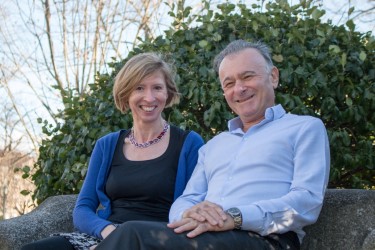
UNC political scientists Liesbet Hooghe and Gary Marks have been married since 1999. They are among the world’s leading experts on Brexit and Europe’s shifting political dynamics.
Faculty duo studies EU governance issues in a global economy
UNC political scientists Liesbet Hooghe and Gary Marks have been married since 1999. They are among the world’s leading experts on Brexit and Europe’s shifting political dynamics. (photo by Kristen Chavez)
Political scientists Liesbet Hooghe and Gary Marks are the world’s leading experts on multilevel governance. They were the first to define the concept more than two decades ago as a way to explain the decentralized local and regional governing structures cropping up across the European Union.
They are academic stars in Europe. Their work is especially relevant in the wake of the Brexit vote leading to a British withdrawal from the EU, and it sheds light on the rising tide of nationalistic populism, which is not only sweeping the continent but apparently influenced the election of President Donald Trump in the United States.
The duo’s research shows how multilevel governance is dispersing authority “downwards, upwards and sideways from centralized government,” said Hooghe.
She and Marks believe that interconnected regional governments and entities may provide new ways for addressing unintended consequences of a global economy.
But game-changing trends in the EU and the U.S. show that government is not just about producing the best policy, the UNC professors said. Sudden political shifts also reveal voters’ fears about the changing demographics of their communities, as people and goods move more freely across borders.
“We realized that citizens feel very strongly connected to their communities,” Marks said. “This is an emotional connection having to do with their cultural identity.”
He and Hooghe note that multilevel governance can foster participatory democracy with more citizen engagement at local and regional levels. For example, the Covenant of Mayors (representing 900 communities across Europe) is collaborating with the U.S. Conference of Mayors to meet strict climate and energy goals demanded by local citizens on both continents.
The professors’ most recent research involves a five-year project on the causes and consequences of multilevel governance, supported by a major grant from the European Research Council. This will culminate in a five-volume series with Oxford University Press.
“The dilemma of governance is that the functional need for human cooperation only rarely coincides with the territorial scope of community,” they write in their project summary. “Humans have a tremendous capacity for altruism. But communities are also parochial: They differentiate themselves from outsiders and resist ‘foreign’ rule.’”
One reviewer called the couple’s recent work “groundbreaking,” shedding light on “one of the most remarkable governance trends in the world today.”
European-born Marks and Hooghe reflect the growing internationalization of the Carolina faculty, as the University continues to embrace global education. They are a cosmopolitan couple (married since 1999) with a firm foot on both sides of the Atlantic. They enjoy teaching and conducting research with students in Chapel Hill and Europe.
Marks, the Burton Craige Professor of Political Science, was born in London and received a Ph.D. in political science at Stanford. He joined the UNC faculty in 1986, and co-founded and directed UNC’s Center for European Studies and the EU Center for Excellence a few years later. He is a citizen of the United States, Great Britain, and, for a little while longer, the European Union.
Hooghe, the W.R. Kenan Distinguished Professor of Political Science, was born in a small town near Brussels and educated in Belgium. Before coming to UNC in 2000, she held fellowships at Cornell and Oxford universities and taught at the University of Toronto. She is a citizen of Belgium and the EU, and a legal resident (and soon a citizen) of the United States.
The two had been separately studying European integration when they first met in 1993 (she invited him to an international conference). More than half of their research involves their joint work on multilevel governance and European integration.
By Dee Reid
Published in the Spring 2017 issue | Tar Heels Up Close
Read More

Expand your library: More books by College faculty and alumni (spring 2017)
Explore a list of books written by College faculty and…

PlayMakers stages Shakespeare for everyone
PlayMakers Repertory Company has always had a long relationship with…


